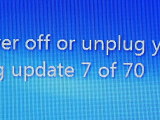
After reading a couple of articles on LWN, I looked over the license of the Ubuntu font which I have been using on my webpage and realized that its license may or may not allow me to embed their font on my web page with the name "Userspace", depending on whether the changes I made (removing a lot of glyphs and converting it in to various web-friendly formats) constitutes a "Substantially Changed" font.
In truth, I was never 100% happy with this font. While Ubuntu's font is one of the relatively few open-source proportional fonts with delta hinting, this actually doesn't matter because I used a semi-bold version without delta hinting at the sizes the webpage renders the font. The font looked a little too stylized for my tastes, since its "science fiction" look didn't quite work with the rest of the web page's design.
Since the 2011 web page redesign, Adobe has released a new open source font called "Source Sans Pro", which is OFL-licensed (I can use it as long as I rename it; to make the transition as easy as possible, I just renamed it "Userspace" to minimize the CSS changes). This font is less stylized and has a more informal and friendly look to it. It looks best with advanced font hinting, but is perfectly readable with basic hinting (such as in legacy Windows XP installs) or even on a monochrome display.
I used to believe that SSD (Solid State Drive) hard disks were immune to failure. While I have been making regular backups, I kept the backups home before going traveling. Naturally, my SSD hard disk died on me just one week after leaving my backups 2,000 miles away.
Fortunately, I was able to burn recovery DVDs to restore the system before the SSD completely died, and get a fairly inexpensive replacement hard disk down here.
I am still recovering from the failure, but am productive at work again and have a much cleaner system now. This was a time consuming process. As just one example, Windows updates everything at once after a system restore. I lost my GPG private keys; it has been time to make new MaraDNS signing keys (the last key was generated over a decade ago) and the next release of Deadwood will be signed with the new key.
Unfortunately, for the paranoid out there, I will not be able to sign the new key with the old key until I return from my travels and have access to my old backups, probably mid-October.
This section continues my look at Slashdot which I started a week ago
Slashdot started to change with the Napsterization of the Internet. Before Napster, copyright infringement was frowned upon in public forums.
The original Linux developers respected copyright. They went to great effort to make a clean-room implementation of Linux which did not violate any copyright or patent laws. Their effort paid off: Linux became the dominant free Unix while BSD was fighting a copyright lawsuit from the original creators of UNIX.
Napster changed the face of the Internet and how people looked at copyright. Before, the Internet community understood that making meaningful intellectual property was hard work and should be respected. Once Napster allowed anyone with an Internet connection to have all the music they wanted for free, with only a small nagging detail that it was violating copyright, thousands of self-centered young college students and others did just that.
Instead of taking the high road, Slashdot decided to (by and large) side with the masses of people coming up with convoluted rationalizations and justifications for downloading copyrighted content without permission.
This resulted in Slashdot attracting a much less mature community of posters. It was the beginning of the fall of Slashdot.
In a future blog entry, I will discuss some of Slashdot's other problems which stopped me from being an active poster there.
Continued in Slashdot: A final look
In order to reduce spam, comments for this entry are now closed
